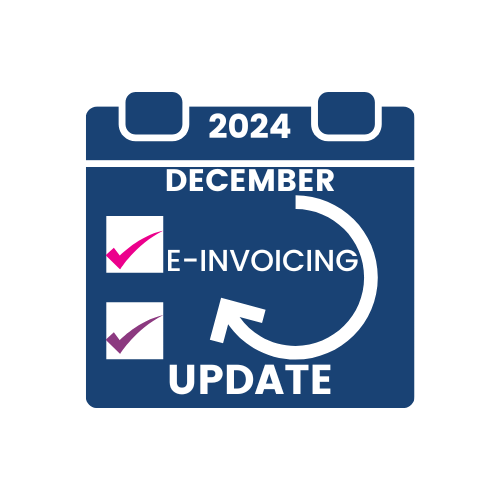Poland
On 6 November 2024, the Polish Ministry of Finance (MoF) published a long-awaited set of documents regarding KSeF, including the draft Act proposing changes on mandatory e-invoicing via KSeF and technical documents describing the proposed new schema FA_VAT(3) and FA_VAT_RR(1). Additionally, the Ministry of Finance has presented a timeline regarding changes around KSeF for 2025/2026.
Saudi Arabia
ZATCA announced the seventeenth wave of taxpayers required to comply with Phase 2 of the e-invoicing mandate. This group includes businesses whose annual revenue is subject to VAT and exceeds SAR 2.5 million (approximately EUR 616 000) in 2022 or 2023. To comply with Phase 2 of the mandate, these taxpayers are required to integrate with the FATOORA platform by 31 July 2025.
Chile
Changes in the field of Value Added Tax from 1 November 2024. Law No. 21,713, published on 24 October 2024, introduces fundamental changes to VAT on imports. It removes the VAT exemption for goods under USD 41 and applies VAT to remote purchases up to USD 500 by non-VAT taxpayers.
Denmark
The Government of Greenland released an executive order on Digital Invoicing to enforce e-invoicing in the public sector in 2025. The executive order released on 11 November 2024 mandates all legal and natural persons to send electronic invoices when delivering goods or services to public authorities. The obligation becomes effective as of 1 March 2025.
A new version of Denmark’s e-invoicing format OIOUBL 3 has been announced. The release candidate of the OIOUBL 3 Invoice Package reveals that invoice message response becomes mandatory, several alignments to the European e-invoicing standard (EN 16931) are made, and a migration plan between the old OIOUBL 2.1 and OIOUBL 3 is specified.
Spain
The Spanish Congress of Deputies has approved the draft bill for implementing the Pillar 2 global minimum tax, aligning with Council Directive (EU) 2022/2523. Now, it awaits approval from the Senate. The bill introduces the Pillar 2 income inclusion rule (IIR) and the undertaxed payment/profit rule (UTPR) to ensure a minimum tax level of 15% for multinational enterprise (MNE) groups with annual consolidated revenue of at least EUR 750 million in at least two of the last four financial years. It also includes a qualified domestic minimum top-up tax (QDMTT).
New web services for Veri*factu and non-Veri*factu invoices available in preproduction. Starting December 2, 2024, new web services for invoice submission on request for non-Veri*factu systems and invoice query services for Veri*factu systems are available in the PREPRODUCTION environment.
Bolivia
The National Tax Service from Bolivia, SIN, published a new resolution to extend the timeline for starting to issue only electronic documents for the ninth group of taxpayers. Starting 1 March 2025, taxpayers belonging to this group are required to issue only digital tax documents via the assigned modality instead of the original date, which was 1 December 2024.
China
The State Taxation Administration (STA) in China has officially declared the roll-out of the nationwide fully digitalized e-fapiao, starting 1 December 2024. Following the Pilot Program, which was gradually expanded to the whole country from 1 December 2021, the STA decided to officially promote e-fapiao invoices countrywide. Therefore, as of 1 December 2024, all taxpayers, not only the selected or newly registered ones, will be allowed to issue e-fapiao.
Romania
Romania provides further insight into upcoming B2C invoicing requirements. The Romanian government has circulated draft legislation on the upcoming obligation to report invoices for B2C transactions. Legislation passed in June 2024 established the requirement for taxpayers engaging in business-to-consumer transactions to transmit electronic invoices as of January 2025. The draft legislation supplements and clarifies select aspects related to the expansion of the mandate.
Germany
Following the latest legislative amendments in Germany, the retention period for invoices will be reduced to eight years as of 2025. Under the upcoming mandate, small businesses will be exempt from issuing EN-compliant electronic invoices but must be able to receive them.
Greece
e-Delivery delayed until 2025. The Independent Authority for Public Revenue (IAPR) has postponed the implementation of the e-delivery system. Despite taxpayers’ efforts, the December 1, 2024, deadline for the new e-delivery documents framework was unachievable.
Costa Rica
Version 4.4 Of Electronic Receipts Becomes Mandatory On June 1, 2025. The Gazeta Official Published The Resolution On The Technical Provisions Of Electronic Receipts For Tax Purposes, Which Contains Version 4.4 Of The Electronic Receipts.
Estonia
Estonia plans to roll out mandatory e-invoicing from 2027. The Estonian Ministry of Finance proposed abolishing the threshold for declaring taxable transactions and making e-invoices mandatory, possibly entering into force in 2027.
Bosnia And Herzegovina
Mandatory e-invoicing on the horizon in Bosnia and Herzegovina. Draft Law introduces mandatory e-invoicing for B2G, B2B, and B2C sectors to combat tax evasion and unfair competition in the country.
India
India releases educational materials for taxpayers on E-Invoicing system. On 29 November 2024, the GSTN published an Advisory No. 461, it contains the glossary on e-invoicing and a step-by-step guide to help taxpayers understand and implement mandatory e-invoicing requirements.
Saudi Arabia
Eighteenth wave of the taxpayers in scope of Phase 2 of mandatory e-invoicing announced. All taxpayers from the eighteenth wave of the Phase 2 of e-invoicing mandate, are obliged to issue e-invoices and integrate with FATOORA platform by 31 August 2025.
Türkiye
The Turkish Revenue Administration announced the transition to the New Central Application of e-Invoice and e-Waybill starting December 14, 2024.
EU
The EU Council introduces electronic VAT exemption certificate. Following the ViDA initiative, the EU is taking another significant step towards modernizing tax processes by implementing a VAT exemption e-certificate, which removes the necessity for paper certificates to be manually signed. This initiative represents a significant move towards digitalization in tax processes across the EU.
Japan
The Digital Agency (Japan Peppol Authority) has recently published updated specifications for standard invoices and self-billing invoices.




